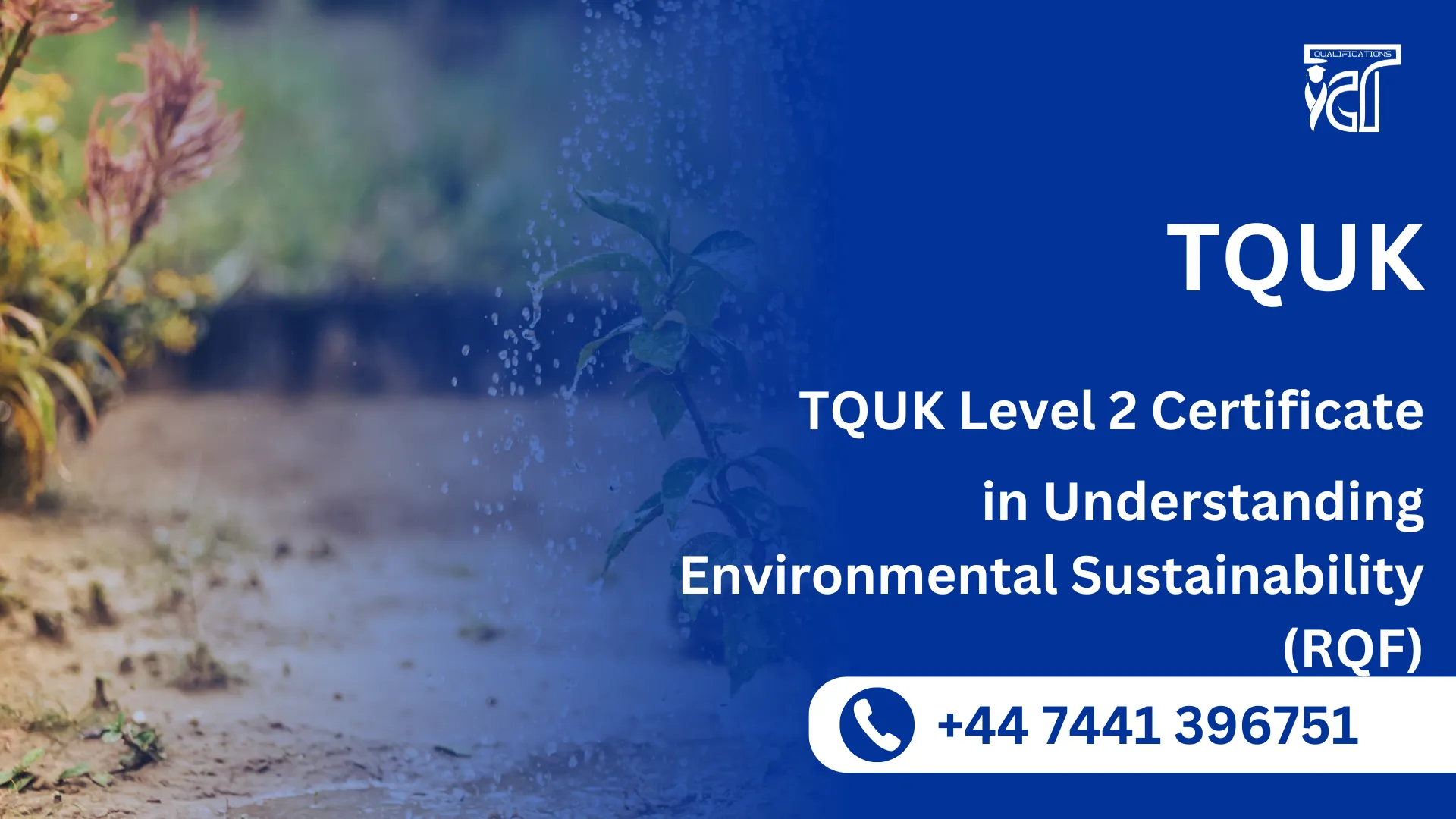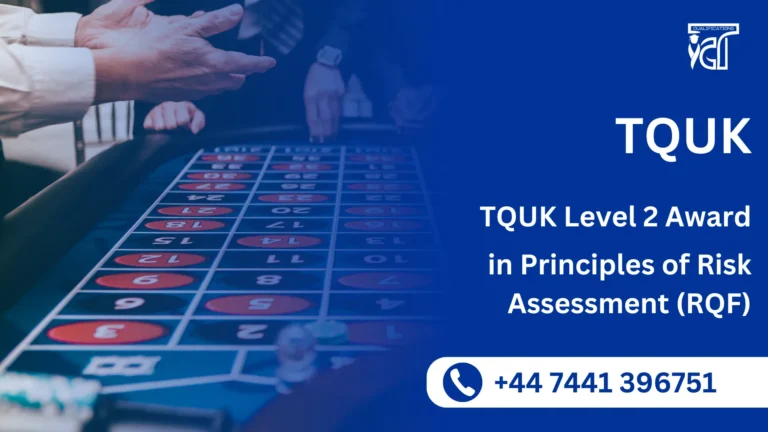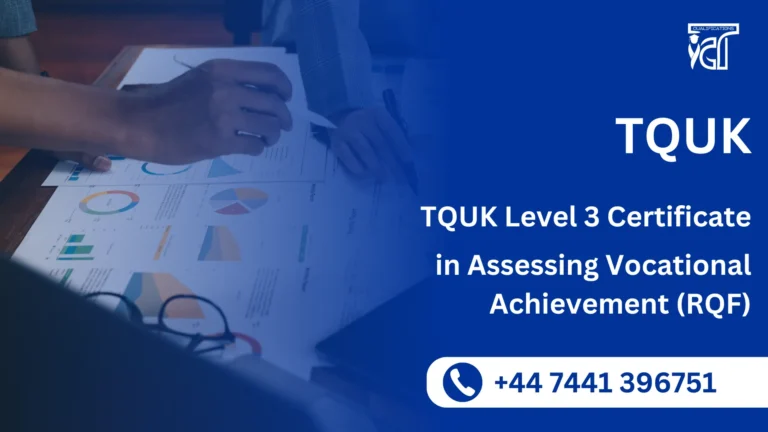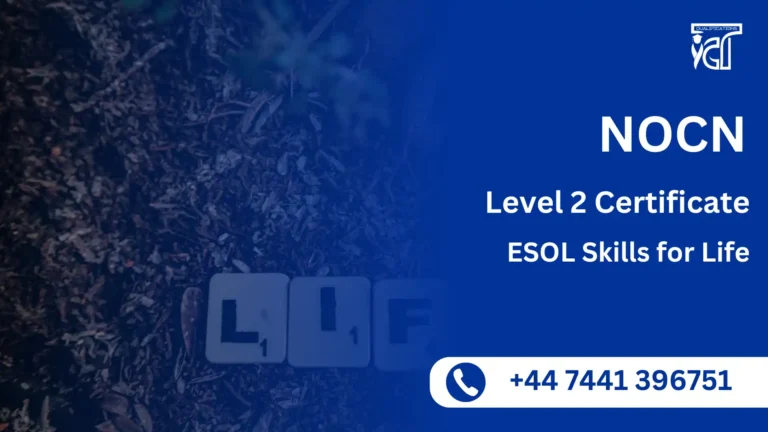In today’s world, environmental sustainability has become a critical focal point across industries and sectors. As businesses and individuals are increasingly urged to make eco-conscious decisions, there is a growing demand for qualifications that equip individuals with the knowledge and skills to understand and contribute to environmental sustainability. One such qualification that stands out is the TQUK Level 2 Certificate in Understanding Environmental Sustainability (RQF). This Ofqual-regulated qualification offers an in-depth understanding of environmental sustainability, providing a solid foundation for anyone looking to make a positive impact on the planet.
The TQUK Level 2 Certificate in Understanding Environmental Sustainability (RQF) is a nationally recognized qualification regulated by Ofqual. The qualification is designed to provide learners with essential knowledge and understanding of environmental sustainability issues, their implications, and how individuals and organizations can contribute to positive environmental change.
This qualification is particularly beneficial for individuals seeking to develop their understanding of sustainability principles and practices, whether they are working in sustainability roles, considering a career change, or simply looking to improve their eco-conscious decisions in everyday life.
Unlike traditional exams, the TQUK Level 2 Certificate in Understanding Environmental Sustainability is entirely assignment-based. This assessment method offers several benefits, particularly for learners who prefer practical applications of their knowledge rather than formal examinations.
Throughout the course, learners will complete various assignments that demonstrate their understanding of the core topics. These assignments are designed to be comprehensive yet manageable, allowing learners to engage with the material at their own pace.
The TQUK Level 2 Certificate in Understanding Environmental Sustainability (RQF) is an excellent qualification for anyone seeking to deepen their understanding of environmental sustainability. It offers a flexible, assignment-based approach to learning, making it accessible to individuals at all stages of their careers or education. Whether you are looking to enhance your professional qualifications, develop eco-conscious habits, or contribute to sustainability efforts in your organization, this qualification provides the knowledge and skills necessary to make a meaningful impact.
In a world where environmental concerns are more pressing than ever, investing in your understanding of sustainability through this Ofqual-regulated qualification is a proactive step toward building a greener future.
TQUK Level 2 Certificate in Understanding Environmental Sustainability (RQF)
The TQUK Level 2 Certificate in Understanding Environmental Sustainability (RQF) consists of 6 mandatory unit, 15 credit value, and 101 Guided Learning Hours (GLH) for this qualification.
| Sr# | Unit Title | Credit Hours |
|---|---|---|
| 1 | Principles of sustainable communities | 3 |
| 2 | Principles of sustainable development | 3 |
| 3 | Principles of sustainable energy management | 3 |
| 4 | Principles of sustainable transport | 2 |
| 5 | Principles of sustainable waste management | 2 |
| 6 | Social responsibility of businesses in relation to sustainability | 2 |
GLH (Guided Learning Hours) and TQT (Total Qualification Time) are terms commonly used in vocational qualifications to help define the amount of time a learner is expected to spend on their studies.
1. GLH (Guided Learning Hours)
GLH refers to the number of hours a learner spends being directly taught, supervised, or supported during their course. This includes the time spent in activities such as:
- Classroom instruction
- Practical workshops
- One-on-one tutoring or mentoring sessions
- Online learning sessions with tutor support
In other words, GLH represents the time that learners are actively engaged with their instructors or learning activities.
2. TQT (Total Qualification Time)
TQT represents the total amount of time a learner is expected to invest in completing a qualification, including:
- GLH (Guided Learning Hours): Time spent on direct learning, as explained above.
- Self-Directed Learning: This includes time spent on independent study, research, assignment completion, preparation for exams, and any other work the learner does outside of direct teaching hours.
TQT is a broader measure that includes all the time required to achieve the qualification. It helps learners and employers understand the overall commitment required for the qualification.
Key Differences Between GLH and TQT:
- GLH focuses on direct learning with guidance or supervision.
- TQT includes GLH as well as independent study time and other learning-related activities.
Example:
If a qualification has a TQT of 600 hours and a GLH of 250 hours, it means the learner should spend 250 hours in direct learning (classroom, online, or tutor-led sessions) and 350 hours on independent study or research.
Here are the learning outcomes for each of the study units you’ve listed for the TQUK Level 2 Certificate in Understanding Environmental Sustainability (RQF):
1. Principles of Sustainable Communities (3 Credits)
Learning Outcomes:
- Understand the characteristics of a sustainable community: Recognize the key features that make a community sustainable, including social inclusion, economic viability, and environmental stewardship.
- Identify the social, economic, and environmental factors influencing sustainable communities: Assess the interconnections between social well-being, economic development, and environmental health within communities.
- Evaluate the role of individuals and organizations in promoting sustainable communities: Examine how both individuals and organizations contribute to the development and maintenance of sustainable communities.
2. Principles of Sustainable Development (3 Credits)
Learning Outcomes:
- Understand the concept of sustainable development: Define sustainable development and explore its global significance in balancing environmental, social, and economic factors.
- Describe the three pillars of sustainability (environmental, economic, and social): Understand the interconnectedness of these pillars and how they influence decision-making.
- Assess the importance of sustainable development in addressing global challenges: Evaluate how sustainable development can address issues like climate change, resource depletion, and inequality.
3. Principles of Sustainable Energy Management (3 Credits)
Learning Outcomes:
- Understand the key principles of sustainable energy management: Identify methods for managing energy use efficiently and sustainably.
- Evaluate renewable energy sources and their contribution to sustainability: Analyze various renewable energy options (solar, wind, hydropower) and their role in reducing environmental impact.
- Understand the importance of energy efficiency in reducing environmental footprints: Discuss strategies for improving energy efficiency at both organizational and individual levels.
4. Principles of Sustainable Transport (2 Credits)
Learning Outcomes:
- Understand the importance of sustainable transport solutions: Recognize the role of transport in contributing to environmental issues such as air pollution and carbon emissions.
- Identify sustainable transport options: Explore various alternatives to traditional fossil-fuel-based transport, including electric vehicles, cycling, and public transportation.
5. Principles of Sustainable Waste Management (2 Credits)
Learning Outcomes:
- Understand the principles of sustainable waste management: Explain key concepts such as waste reduction, recycling, and circular economy.
- Identify strategies to minimize waste and promote recycling: Discuss practical steps for reducing waste at individual and organizational levels, including recycling programs and waste reduction techniques.
6. Social Responsibility of Businesses in Relation to Sustainability (3 Credits)
Learning Outcomes:
- Understand the concept of corporate social responsibility (CSR) in the context of sustainability: Define CSR and its importance in business operations.
- Evaluate how businesses can integrate sustainable practices into their operations: Discuss strategies that businesses can implement to ensure sustainable practices, such as reducing carbon footprints, ethical sourcing, and supporting local communities.
- Assess the role of businesses in promoting environmental and social sustainability: Evaluate the positive impact businesses can have on environmental sustainability and social well-being through responsible practices.
Benefits of the TQUK Level 2 Certificate in Understanding Environmental Sustainability (RQF)
The TQUK Level 2 Certificate in Understanding Environmental Sustainability (RQF) is a comprehensive qualification that offers numerous benefits for individuals looking to deepen their knowledge and understanding of environmental sustainability. Here are some key advantages of completing this qualification:
1. Gain a Comprehensive Understanding of Sustainability
- This course covers a wide range of topics related to sustainability, including sustainable communities, energy management, transport, waste management, and corporate social responsibility. By the end of the course, you’ll have a holistic understanding of how environmental, social, and economic factors interconnect in the pursuit of sustainability.
2. Career Advancement Opportunities
- As sustainability becomes an increasingly important focus for businesses and organizations globally, completing this qualification provides you with valuable knowledge that can enhance your career prospects. Whether you’re in an environmental, business, or operational role, this qualification can make you a more attractive candidate to employers seeking professionals with expertise in sustainable practices.
3. Flexible, Assignment-Based Assessment
- The qualification is entirely assessed through assignments, allowing you to study at your own pace. This flexibility is ideal for working professionals, students, or anyone with a busy schedule. Instead of sitting exams, you can apply your learning through practical assignments, making the process less stressful and more applicable to real-world situations.
4. Ofqual-Regulated Qualification
- Being regulated by Ofqual, this qualification holds official recognition within the UK education system. Employers and educational institutions recognize its credibility, ensuring that your achievement is respected and valued across various industries.
5. Practical Knowledge You Can Apply Immediately
- This course is designed to provide practical and actionable knowledge. You will learn about sustainable energy management, waste reduction strategies, sustainable transport solutions, and corporate social responsibility practices that you can implement in both personal and professional settings.
6. Increased Employability in a Growing Field
- The environmental sustainability sector is expanding rapidly, with businesses and governments prioritizing eco-friendly practices. This qualification equips you with the skills and knowledge to play a vital role in these efforts, increasing your employability in a fast-growing and essential field.
7. Support for Sustainable Business Practices
- For business owners and managers, this qualification provides insights into how to integrate sustainability into business operations. You’ll learn about reducing environmental impact, corporate social responsibility (CSR), and ethical practices that are not only good for the environment but also beneficial for brand reputation and long-term profitability.
8. Contribution to Global Sustainability Goals
- Completing this qualification allows you to contribute positively to global sustainability efforts. You’ll be better equipped to make decisions that help reduce your carbon footprint, promote ethical practices, and support initiatives that benefit the environment, thereby contributing to achieving global goals like the UN Sustainable Development Goals (SDGs).
9. Cost-Effective Education
- The TQUK Level 2 Certificate offers great value for money. It is a cost-effective way to gain formal recognition of your sustainability knowledge without the need for extensive and expensive formal education programs. The assignment-based approach also ensures that you can balance learning with your professional and personal life.
10. Boost Your Personal Eco-Consciousness
- Even if you are not looking to pursue a career directly related to sustainability, this qualification can empower you to make more informed, eco-conscious decisions in your daily life. You will learn practical methods to reduce your environmental footprint, whether through energy use, waste management, or transportation choices.
11. Professional Development and Networking
- Completing this qualification provides an opportunity to connect with like-minded individuals and professionals interested in sustainability. Whether you’re studying alone or in a group, you’ll be part of a community that values environmental responsibility, opening doors for professional networking and potential collaboration.
12. Prepare for Further Study
- The TQUK Level 2 Certificate is an excellent stepping stone for those who want to pursue further education in sustainability. Whether you want to continue with more advanced qualifications in sustainability, environmental science, or environmental management, this course provides a solid foundation for your academic and professional future.
Best Fit for the TQUK Level 2 Certificate in Understanding Environmental Sustainability (RQF)
The TQUK Level 2 Certificate in Understanding Environmental Sustainability (RQF) is ideal for a diverse range of individuals and professionals who are passionate about sustainability and want to develop their understanding of key environmental issues. Here are the groups who would benefit most from this course:
1. Environmental Professionals and Enthusiasts
- Best Fit: Those already working in or aspiring to work in the environmental sustainability sector, such as environmental consultants, sustainability officers, or eco-analysts.
- Why It’s a Good Fit: This course provides foundational knowledge and practical skills related to sustainability, energy management, waste management, and sustainable business practices, making it an ideal qualification for individuals looking to advance their careers or move into this growing field.
2. Business Owners and Managers
- Best Fit: Business owners, managers, and decision-makers who are looking to integrate sustainability practices into their business operations.
- Why It’s a Good Fit: The course covers key topics such as corporate social responsibility (CSR), sustainable energy management, and waste management strategies, helping businesses adopt more sustainable practices that not only benefit the environment but also improve efficiency and enhance brand reputation.
3. Individuals Pursuing Careers in Sustainability
- Best Fit: Students, graduates, or career changers who are looking to start a career in sustainability or environmental management.
- Why It’s a Good Fit: This qualification provides a thorough introduction to environmental sustainability and offers the knowledge needed to enter the field. It’s a great starting point for individuals who want to develop expertise that is increasingly in demand across various industries.
4. Public Sector Professionals
- Best Fit: Employees working in local government, non-governmental organizations (NGOs), or public services who are involved in sustainability initiatives or policymaking.
- Why It’s a Good Fit: The course aligns well with roles in public sector organizations that are tasked with promoting sustainability, whether through policy development, community engagement, or environmental projects.
5. Educators and Trainers
- Best Fit: Teachers, trainers, or educators who wish to incorporate environmental sustainability topics into their curriculum or training programs.
- Why It’s a Good Fit: Educators who wish to teach sustainability topics or deliver sustainability-focused training can benefit from this qualification by acquiring up-to-date, practical knowledge that they can pass on to their students.
6. Corporate Social Responsibility (CSR) Professionals
- Best Fit: Professionals working in CSR roles who want to enhance their understanding of sustainability and contribute to their organization’s sustainability goals.
- Why It’s a Good Fit: CSR professionals are responsible for ensuring that their organization acts responsibly toward the environment and society. This course provides insights into sustainable practices, CSR strategies, and how businesses can operate more sustainably.
7. Individuals Interested in Sustainable Living
- Best Fit: Anyone with a personal interest in living more sustainably or making a positive environmental impact, including those who are interested in reducing their carbon footprint, managing waste more effectively, or supporting green initiatives.
- Why It’s a Good Fit: The course offers practical, everyday knowledge that can help individuals make informed decisions about their own environmental practices, from energy consumption to sustainable transport and waste management.
8. Human Resources and Training Professionals
Why It’s a Good Fit: With many organizations adopting sustainability initiatives, HR professionals can use this qualification to support their teams in learning about environmental sustainability, aligning employee development with corporate sustainability goals.
Best Fit: HR professionals or training managers within companies or organizations who are responsible for staff development and want to offer sustainability-focused learning opportunities.
Entry Requirements
Register Now
Qualification Process
Qualification Process for the TQUK Level 2 Certificate in Understanding Environmental Sustainability (RQF)
- Self-Assessment:
Begin by evaluating your eligibility to ensure you meet the qualification requirements, including work experience, knowledge, and language proficiency. - Registration:
Complete your registration by submitting the required documents, including a scanned copy of a valid ID, and paying the registration fee. - Induction:
An assessor will conduct an induction to confirm your eligibility for the course and explain the evidence requirements. If you do not meet the criteria, your registration will be canceled, and the fee will be refunded. - Assignmnets & Evidence Submission:
Provide all assignmnets and the necessary evidence based on the assessment criteria outlined in the course. If you are unsure of the required evidence, consult with the assessor for guidance on the type and nature of evidence needed. - Feedback and Revision:
The assessor will review your submitted evidence and provide feedback. Evidence that meets the criteria will be marked as “Criteria Met,” while any gaps will be identified. You will be asked to revise and resubmit if needed. - Competence Evidence:
Submit final evidence demonstrating that all learning outcomes have been met. This evidence will be marked as “Criteria Met” by the assessor once it is satisfactory. - Internal Quality Assurance (IQA):
The Internal Quality Assurance Verifier (IQA) will review your evidence to ensure consistency, quality, and compliance with standards. - External Verification:
The IQA will submit your portfolio to TQUK External Quality Assurance Verifiers (EQA) for final confirmation. The EQA may contact you directly to verify the authenticity of your evidence. - Certification:
Upon successful completion of all checks, TQUK will issue your official certificate, confirming that you have attained the TQUK Level 2 Certificate in Understanding Environmental Sustainability (RQF).







